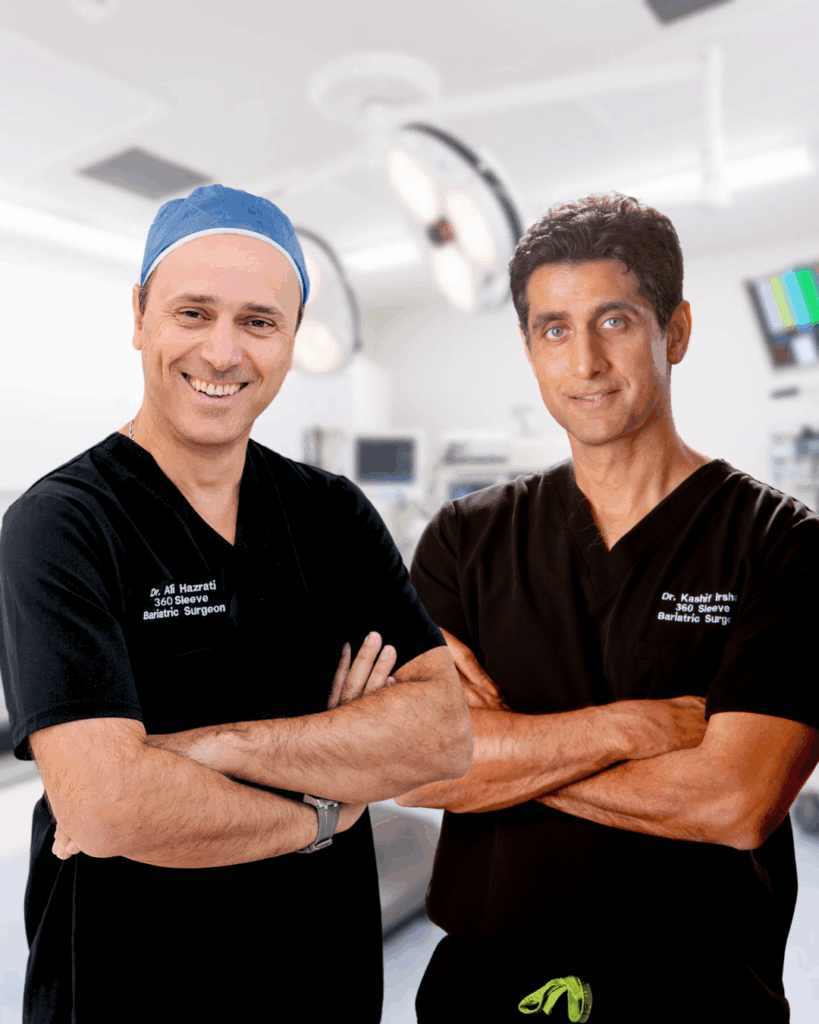What to Expect After Gastric Sleeve Surgery
Here's what you can expect during your gastric sleeve recovery.
Your Journey with Us Doesn’t End After Surgery
After gastric sleeve surgery, your new life begins.
You can be confident of the care and guidance we provide as you continue on your weight loss journey with us. This includes your post-operative and recovery phase, which plays a crucial role in your long-term success.
Our goal is to provide you with all the information and support you’ll need during this important time.
Exceptional Gastric Sleeve Recovery Care & Support
We’re with you every step of the way.
Your recovery is a vital part of your weight loss journey, and we’re committed to helping you achieve optimal results and embrace a healthier, happier life.
Here we provide information about common concerns you may have, practical tips, and valuable insights, which can help ensure your smooth and successful recovery.
Whether you’re curious about managing pain, adapting to new dietary changes, incorporating new exercise routines, or simply maintaining a positive mindset, we’re here to support you every step of the way.
WHAT TO EXPECT
Your Recovery Timeline
Important steps to ensure a speedy gastric sleeve recovery.
- Meet with your dietician to discuss/begin your new pre-op diet.
- This is important because your diet is designed to help shrink the size of your liver (a large liver during gastric sleeve surgery can increase the risk of complications).
- Some patients may need to go on a liquid diet to shrink their liver before the gastric sleeve surgery. A large liver may increase the risk of surgical complications.
- Directly after surgery, you’ll be required to stay at our clinic for a few hours.
- After this observation period, you may be released from the clinic.
- Expect a moderate level of discomfort, which will be managed with pain medication administered by IV.
- Diet will strictly consist of ice chips given every couple of hours.
- Activity will consist of short walks every couple of hours. It is critical that you begin walking immediately.
- Expect a more level of discomfort, which will be managed with oral prescribed pain medication.
- Diet will consist of strictly clear fluids such as apple juice, broth, popsicles, and electrolytes (sugar-free).
- Activity will consist of short walks (15-minute walks, three times a day) and light stretching.
- Expect a continued level of discomfort, which will be managed with oral prescribed pain medication.
- Diet will consist of full liquids such as vegetable juice and milk (you must avoid alcohol, caffeine, and carbonated drinks).
- Activity will consist of longer and more frequent walks, along with stair climbing.
- For Week 1, you’ll be on a liquids-based and blended diet to help settle your stomach, with restrictions on what you can consume (you’ll have met with your dietician in the weeks leading up to surgery to prepare for this phase).
- Ensure that you’ve scheduled the appropriate amount of time off work to recover.
- At the 3-week mark, you can expect your pain levels to drop to minimal; no medication will be required.
- Your diet will consist of selected soft, pureed, and solid food (such as yogurt pureed with frozen strawberries, or low-fat cream of chicken soup blended with canned, drained chicken breast) for 3 months after the date of your surgery (you must also avoid spicy foods, raw fruits, raw vegetables, rice, and crackers).
- Activity will consist of low-impact aerobic exercise.
- You can begin to resume more vigorous activities including cardio such as running, swimming, skipping rope, etc.
- You should also continue walks (15-minute walks, three times a day).
- After two months, you can progress to a regular diet (including soft fruits, finely diced moist meats, cooked vegetables, etc.) as tolerated with restrictions to portion sizes.
- Expect minimal to non-existent pain.
- Your diet will consist of solid foods.
- Activity will consist of more rigorous exercise – with weights incorporated after 6 months.
- Expected weight loss results may take up to 18 months.
- Meet with your dietician to discuss/begin your new pre-op diet.
- This is important because your diet is designed to help shrink the size of your liver (a large liver during gastric sleeve surgery can increase the risk of complications).
- Directly after surgery, you’ll be required to stay at our clinic for a few hours.
- After this observation period, you may be released from the clinic.
- Expect a moderate level of discomfort, which will be managed with pain medication administered by IV.
- Diet will strictly consist of ice chips given every couple of hours.
- Activity will consist of short walks every couple of hours. It is critical that you begin walking immediately.
- Expect a more intense level of discomfort, which will be managed with oral prescribed pain medication.
- Diet will consist of strictly clear fluids such as apple juice, broth, popsicles, and electrolytes (sugar-free).
- Activity will consist of short walks (15-minute walks, three times a day) and light stretching.
- Expect a continued level of intense discomfort, which will be managed with oral prescribed pain medication.
- Diet will consist of full liquids such as vegetable juice and milk (you must avoid alcohol, caffeine, and carbonated drinks).
- Activity will consist of longer and more frequent walks, along with stair climbing.
- For Week 1, you’ll be on a liquids-based and blended diet to help settle your stomach, with restrictions on what you can consume (you’ll have met with your dietician in the weeks leading up to surgery to prepare for this phase).
- Ensure that you’ve scheduled the appropriate amount of time off work to recover.
- At the 3-week mark, you can expect your pain levels to drop to minimal; no medication will be required.
- Your diet will consist of selected soft, pureed, and solid food (such as yogurt pureed with frozen strawberries, or low-fat cream of chicken soup blended with canned, drained chicken breast) for 3 months after the date of your surgery (you must also avoid spicy foods, raw fruits, raw vegetables, rice, and crackers).
- Activity will consist of low-impact aerobic exercise.
- You can begin to resume more vigorous activities including cardio such as running, swimming, skipping rope, etc.
- You should also continue walks (15-minute walks, three times a day).
- After two months, you can progress to a regular diet (including soft fruits, finely diced moist meats, cooked vegetables, etc.) as tolerated with restrictions to portion sizes.
- Expect minimal to non-existent pain.
- Your diet will consist of solid foods.
- Activity will consist of more rigorous exercise – with weights incorporated after 6 months.
- Expected weight loss results may take up to 18 months.
Post-Operation Exercise Tips
Have fun and get moving after gastric sleeve surgery.
Exercising after gastric sleeve surgery is one of the key components to your weight loss success.
Although there is no one-size-fits-all plan, these tips can help you plan your workout routine.
- Some patients may find it difficult to exercise prior to surgery due to health conditions such as shortness of breath upon exertion, knee or back pain, and heart conditions.
- Avoid abdominal exercises for the first 3 months. You need to let your incisions heal and reduce pressure on your stomach while it’s still sensitive.
- Always check with your doctor before starting an exercise routine.
- Remember to take it slow and increase your workout gradually as you progress.
Setting You Up for Long-Term Success
Your gastric sleeve surgery at 360 Sleeve represents an important step on your weight loss journey – but it’s also just the beginning of a healthier and happier life.
During your gastric sleeve recovery, the support of family members and close friends in the weeks and months afterwards will be integral to your continued success.
We recommend surrounding yourself with those who can provide you with the courage and strength to maintain an active lifestyle – you’ll experience many emotional and physical changes during this time; having a support group will enable you to better focus on your goals.
It’s important to remember that gastric sleeve surgery isn’t a “quick fix” – successful long-term weight loss requires a committed and permanent lifestyle change.
How Long Will It Take for Me to Lose Weight?
You can expect it to take up to 18 months after your gastric sleeve surgery to lose the expected weight.
After the first few months, you’ll lose weight rapidly (most patients can expect to lose between 60 and 70% of their excess weight); in time, however, this loss will be expected to plateau.
Don’t let this discourage you – plateauing is simply a way for your body to get used to the drastic change it is experiencing.
here are many ways to overcome this challenge, such as adding in a new external change to your exercise regime.
Knowledge and preparation of gastric sleeve surgery are two great ways to help you with the success of the procedure and to change your life for the better.
Keep Reading
Learn more about gastric sleeve surgery



BETTER STARTS NOW
Start Your New Life Today
Are you ready to transform your weight, your health, and your life? Take the next step by contacting us now.
